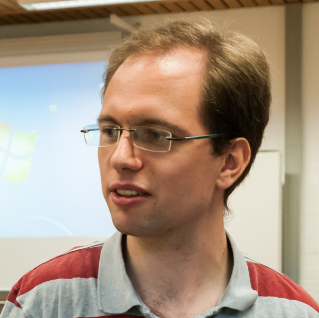
Contact information
johannes.algermissen@psy.ox.ac.uk
 https://orcid.org/0000-0002-1694-7069
https://orcid.org/0000-0002-1694-7069
Wellcome Centre For Integrative Neuroimaging (WIN), Tinsley Building, Mansfield Road, Oxford OX1 3TA
he/him
Johannes Algermissen
PhD, MSc, BSc, BA
Postdoctoral Research Associate in Cognitive Neuroscience
Foraging decisions in humans using behaviour, computational modelling, fMRI, TUS
I am currently a postdoctoral researcher with Dr. Miriam Klein-Flügge and part of the MoDeS lab at the Department of Experimental Psychology, University of Oxford.
Research
I am interested in how humans manage to pursue several goals at the same time over extended time periods without neglecting any of them too much. As a part of this, I try to better understand how humans monitor their own internal needs/ demands and how they monitor and respond to opportunities in the external environment. This involves trade-offs between smaller-sooner and larger-later rewards and might require self-control and persistence to be successful in the long run. Humans and animals face such choices in everyday life, often summarised under the term "homeostasis". However, humans are exceptionally good at planning ahead and using deliberate strategies about when to meet which bodily demand. I am interested which neural mechanisms are involved in creating such plans and implementing them.
As a part of this research line, I am currently working on so-called "foraging" decisions in which human participants decide whether to stay and persist with a choice option they currently have or whether to leave and explore if there might be better alternative options available. I am specifically interested in how intermediate rewards during such decisions shape the effort participants invest and the persistence they show. I am also interested on how assessment of the global richness of the environment influence such choices. To address these questions, I use large-scale online testing, computational modelling of behaviour, and fMRI recordings.
Lastly, I am involved in one of the first studies of its kind using transcranial ultrasonic stimulation (TUS) to stimulate the brain in order to influence learning and decision-making, specifically affective biases and learning of actions towards emotional stimuli.
Education
I obtained Bachelor’s degrees in psychology and philosophy (minor in mathematics) at the Friedrich-Schiller University Jena, Germany, in 2014. After a year at the University of Helsinki, Finland, I pursued a Research Master degree in Behavioural Science at Radboud University, Nijmegen, the Netherlands, graduating summa cum laude in 2017. My Master’s thesis investigated trade-offs between cognitive labour and leisure using pupillometry. I also spent two months at Columbia University, New York City, working on intertemporal choice and procrastination together with Eric J. Johnson and Bernd Figner.
From 2017 till 2022, I pursued a PhD in cognitive neuroscience with Dr. Hanneke den Ouden at the Donders Institute for Brain, Cognition, and Behaviour, Nijmegen, the Netherlands. My dissertation work investigated "Pavlovian" (or "motivational") biases in learning and decision-making, in particular i) how these biases arise through the interplay of cortical and subcortical brain areas, ii) how these biases can be suppressed, iii) how these biases can be adaptively used by selectively exposing oneself to cues that trigger them. I used computational modeling of behavior, simultaneous EEG-fMRI recordings, eye-tracking, and MEG to answer these questions.
I have also been enthusiastically involved in several open science projects aiming to improve psychology and cognitive neuroscience, such as the EEGManyPipelines project, and eCOBIDAS.
Recent publications
-
Prefrontal signals precede striatal signals for biased credit assignment in motivational learning biases.
Journal article
Algermissen J. et al, (2024), Nat Commun, 15
-
Pupil dilation reflects effortful action invigoration in overcoming aversive Pavlovian biases
Preprint
Algermissen J. and den Ouden HEM., (2023)
-
High stakes slow responding, but do not help overcome Pavlovian biases in humans
Preprint
Algermissen J. and den Ouden HEM., (2023)
-
EEGManyPipelines: A Large-scale, Grassroot Multi-analyst Study of EEG Analysis Practices in the Wild.
Journal article
Trübutschek D. et al, (2023), J Cogn Neurosci, 1 - 8

